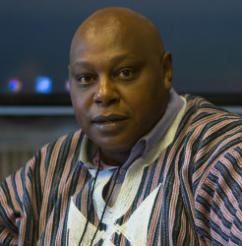Anti-charity measures adopted by the government could have serious ramifications around the world, if adopted by “less democratic nations” who view the British charity sector as an exemplary model, a UN representative said yesterday.
Speaking at the Foreign Press Association, the UN special rapporteur on the rights to freedom of peaceful assembly and of association, Maina Kiai, said Britain’s charity sector was a “national treasure” and the many individuals working for it, the “reason for many of the positive attributes enjoyed in this country”.
But he said the government’s “negative view of civil society” was causing the closure of space for the sector and a “series of separate measures” – including lobbying and banking restrictions - was harming the sector’s ability to hold the government to account.
“These moves have not always made headlines and in many instances, they have been subtle and gradual. But they are as unmistakable as they are alarming,” he said.
In particular, Kiai said the Lobbying Act has had a “chilling effect on the work of charities during election periods” and expressed concerns about the anti-advocacy proposals in government grants to charities.
“The recent announcement that a new clause will be inserted in all new and renewed government grant agreements, prohibiting these funds from being used to lobby government, has caused confusion and uncertainty within the sector,” he said.
“It is far from clear what mischief the clause intends to address or what activities are envisioned as constituting ‘influence or attempting to influence government’, but it is clear that this is being read by charities as an effort to further silence them if they receive government funds.”
Kiai said he has spoken to the Cabinet Office and hopes that “a thorough and open examination of the clause and its impact is carried out”.
'Confusing' EU referendum guidance
The special rapporteur also raised concerns about the Charity Commission’s guidance on the EU referendum.
The guidance released last month caused widespread criticism among sector leaders for its “negative and prescriptive approach”. The original guidance warned charities that they faced “regulatory scrutiny” should they wish to get involved in the EU referendum debate. But criticism from sector leaders later caused a climb-down by the Commission, which reissued guidance with a softer approach.
Yesterday Kiai said the guidance was “confusing”. Taken together with Lobbying Act restrictions, he said the two had the effect of “charities refraining from engaging in activities they normally would, especially when their engagement is most needed, during elections or the referendum”.
“Beyond the UK’s borders, these measures are likely to have serious ramifications if adopted by less democratic states whose intention is to repress civil society,” he said.
“The UK is regarded as a model of democracy and human rights, and actively works at the UN Human Rights Council to support efforts for broader enabling environments for civil society. It is imperative that the same standards that the UK calls for internationally on civil society are implemented domestically.”
De-risking concerns
Kiai said he was particularly concerned about banking restrictions placed on Muslim charities operating in conflict areas.
“I would urge all agencies concerned to do more to ensure that charities and other groups are not subjected to de-risking or de-banking where there are options of mitigating or managing risk,” he said.
“Charities that work in high-risk areas often serve the most vulnerable and desperate, often doing what government’s ask of them. De-risking has serious consequences not just on the rights of association of charities but also on the rights of their beneficiaries,” he said.
The special rapporteur raised concerns that banking restrictions could “push charities into the underground economy”.
“It is within the government’s interest – in the name of public safety – to keep charities within the official banking system,” he said.
Last year, Acevo chief executive Sir Stephen Bubb said an “overzealous” regulatory approach to Muslim charities was harming the fight against terror.
In letters to David Cameron, Ed Miliband and Nick Clegg, he said that freezing charity bank accounts was “rarely productive” and called on them to arrange a meeting with him and the Muslim Charities Forum to discuss the issues. Bubb also spoke out about the Co-operative Bank’s closure of several charities’ bank accounts in November, saying it was a “ludicrous way to treat charities”.









